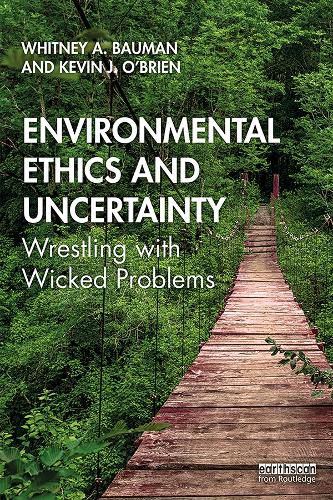Readings Newsletter
Become a Readings Member to make your shopping experience even easier.
Sign in or sign up for free!
You’re not far away from qualifying for FREE standard shipping within Australia
You’ve qualified for FREE standard shipping within Australia
The cart is loading…






This book offers a multidisciplinary environmental approach to ethics in response to the contemporary challenge of climate change caused by globalized economics and consumption. This book synthesizes the incredible complexity of the problem and the necessity of action in response, highlighting the unambiguous problem facing humanity in the 21st century, but arguing that it is essential to develop an ethics housed in ambiguity in response.
Environmental Ethics and Uncertainty is divided into theoretical and applied chapters, with the theoretical sections engaging in dialogue with scholars from a variety of disciplines, while the applied chapters offer insight from 20th century activists who demonstrate and/or illuminate the theory, including Martin Luther King, Rachel Carson, and Frank Lloyd Wright.
This book is written for scholars and students in the interdisciplinary field of environmental studies and the environmental humanities, and will appeal to courses in religion, philosophy, ethics, politics, and social theory.
$9.00 standard shipping within Australia
FREE standard shipping within Australia for orders over $100.00
Express & International shipping calculated at checkout
Stock availability can be subject to change without notice. We recommend calling the shop or contacting our online team to check availability of low stock items. Please see our Shopping Online page for more details.
This book offers a multidisciplinary environmental approach to ethics in response to the contemporary challenge of climate change caused by globalized economics and consumption. This book synthesizes the incredible complexity of the problem and the necessity of action in response, highlighting the unambiguous problem facing humanity in the 21st century, but arguing that it is essential to develop an ethics housed in ambiguity in response.
Environmental Ethics and Uncertainty is divided into theoretical and applied chapters, with the theoretical sections engaging in dialogue with scholars from a variety of disciplines, while the applied chapters offer insight from 20th century activists who demonstrate and/or illuminate the theory, including Martin Luther King, Rachel Carson, and Frank Lloyd Wright.
This book is written for scholars and students in the interdisciplinary field of environmental studies and the environmental humanities, and will appeal to courses in religion, philosophy, ethics, politics, and social theory.